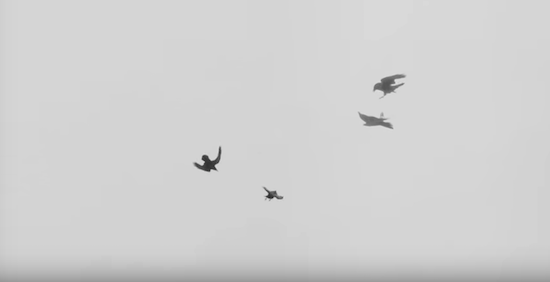Released today, a new short film by Portland, Oregon artist Vanessa Renwick sets solarised footage of owls flying and bears snoozing and Ursula LeGuin being wonderful to music composed by Le Guin and her friend Todd Barton. Barton is the musician, composer and Buchla synth sage who worked with Le Guin on Music & Poetry Of The Kesh, the extraordinary album which was originally a cassette-tape covermount that came free with LeGuin’s 1985 book Always Coming Home, and which was re-released this past spring on Freedom To Spend.
Le Guin died in January, as preparations for the re-release were underway. “I miss her deeply,” Barton told us last week. “Ursula was witty, deeply observant, humorous, with a coyote twinkle in her eyes. Working with her for two years on the Kesh album was the best and most rewarding creative collaboration I’ve ever experienced.”
Barton and Le Guin met when he was working on sound effects for a play at a local university radio station, and soon after she asked him if he’d like to create music for her upcoming book, an ‘imagined ethnography’ of people living in the Northern California. “Of course I unhesitatingly said yes!” says Barton. “I had read most of her work and was definitely a fanboy.
“It was a humbling experience to work with her. She was so brilliant! She would delve into her imagined culture and invite me to join here there. Our discussions immediately embraced the granular level – I have many typewritten and handwritten correspondences from Ursula where she ponders the pronunciation of a single Kesh syllable and how it might be sung.
“Ursula suggested that we both be archaeologists doing imaginary ‘digs’ in the Kesh culture. We would each come back and share the fragments of tunes, lyrics, instruments and sheet music we had found. When it came to my offerings, she would let me know if they were indeed Kesh, or pre-Kesh or from a completely different culture. It was a wonderful way to collaborate!”
The album includes field recordings, and Ursula’s voice, singing and reciting poetry, as well as Todd singing a Kesh lullaby. Then there’s the houmbúta (a huge Kesh horn) and the wéosai medoud teyahi (a Kesh flute made of deer bone). “I built the Kesh instruments in my imagination. I had built Renaissance and Baroque wind instruments before and knew my way around the right questions to ask when creating an instrument. The book deadline precluded us having the time to build the instruments so I programmed my analogue synthesizer – a Roland Jupiter-8 – to create the sounds of these instruments as I hear them in my head.”
The field recordings add rich dimensions to the album, too. “We spent a week at Ursula’s family homestead in the Napa Valley and I recorded every and all sounds that I could, from walking on the floors of an old wood barn, to the sounds of the meadow coming alive at sunrise, campfires at night and the wind in the oaks.”
It’s been “a blast, and a bit surreal” to have the album re-released to a new and wider audience, and to play some of the music again. “The great thing about Always Coming Home and the Music & Poetry Of The Kesh is that it describes a culture that lives well – a model for kindness and compassion. The seemingly mundane daily routines, the rituals, celebrations, poems, music and songs, can still be read aloud to each other, sung to each other. The plays can be performed, the rituals adopted. Ursula created a truly interactive literary ecology.”



